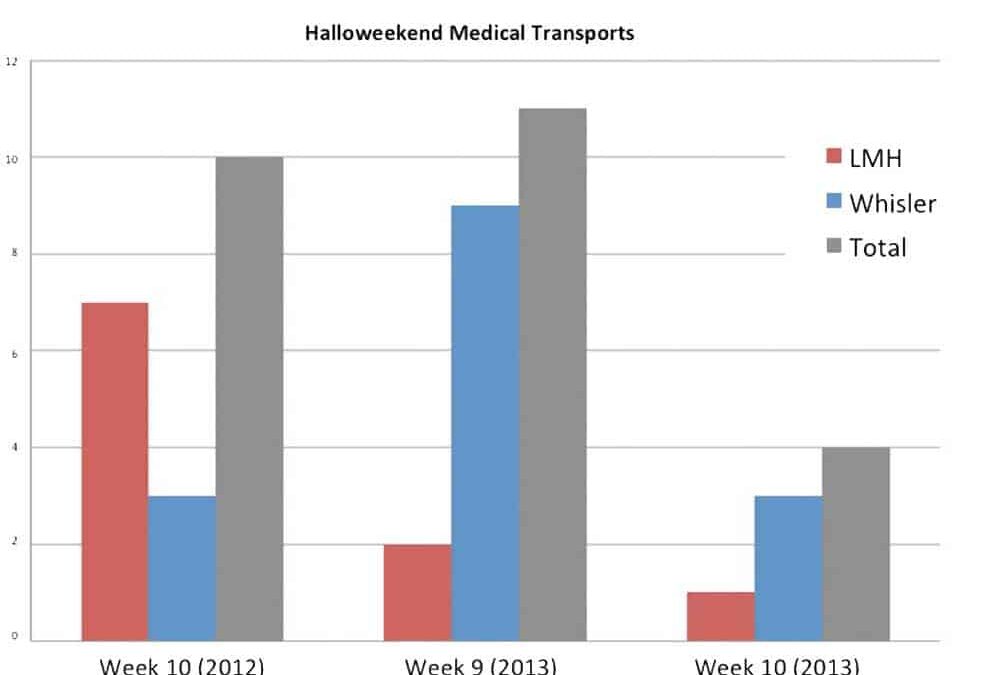Registering parties, party checks, mandatory TIPS training: all these are well-known, recently added features of Denison’s social scene. These policies and many others were recently implemented by the Denison Campus Governance Association (DCGA) and Denison’s administration in response to a spike in alcohol-related incidents over last fall’s Halloweekend.
But how about this year? Is Denison doing better?
Data and vibes suggest a resounding “yes.” This year, Halloweekend medical transports to Licking Memorial Hospital (LMH) were down by over 50 percent — even though this year’s Halloween festivities included two weekends and a Wednesday of parties.
Last year’s Halloween fell on a Wednesday, with most festivities taking place the weekend prior on Friday, Oct. 27 and Saturday, Oct. 28. That Monday, Oct. 29, 2012, Vice President for Student Development Laurel Kennedy sent out a campus-wide email informing the student body that it must change course immediately.
“[T]he worst weekend not just of the year, but of at least the last three years,” Kennedy wrote, saw not only several non-Denison guests go to the hospital for alcohol poisoning and repeated malicious fire alarms, but a “party with upwards of 60 students playing beer pong in a public hallway” and other excesses.
The administration responded with the formation of the Ad Hoc Committee on Alcohol and Its Effects, chaired by Dean of Students Bill Fox. “The Committee will forward recommendations to the President by the end of the semester,” Kennedy wrote, and “an event registration policy will be in place by second semester.” Party registration, a policy the DCGA had planned on implementing anyway, was rapidly approved and became campus protocol. Kennedy also instructed campus security to restrict swipe hours for non-residents to before 11 p.m., down from 1 a.m.
Data from this year suggests that dangerous drinking is down significantly from last year. While roughly the same number of students requested for medical amnesty during the Halloween period, the majority of students were seen at Whisler and did not need emergency medical care. The severity (or lack thereof) of students seen at Whisler is also difficult to glean, says Kennedy.
Roughly 15 percent of students requesting medical amnesty required transport to LMH this year, according to Kennedy’s data. Last year, one third required transport.
There is “very, very good energy” this year as compared to last, says Kennedy. “[It] feels so different,” she says.
Bill Fox agrees. “[I]t’s good when people seek help,” he says, and to “be back in that realm [of one or two transports on a party weekend] is a positive thing…[There have been] lots of positive signs from party registration and students acting as responsible hosts.”
Kennedy and Fox agree that the party registration process has probably encouraged party hosts to act more responsibly. “Much more alcohol consumption is beer,” Kennedy says, with hosts having moved away from providing “crack juice” or “jungle juice.” The hosts of a registered party are dissuaded from serving jungle juice by Campus Security at a mandatory pre-party “checklist meeting.”
Fox thinks most responsible behavior is self-enforced. “Most situations [with party hosts] are being resolved at the door,” he says, and “students are paying attention to reputation factors…[S]tudents are more aware of the issue of alcohol abuse.”
This year’s Halloweekends may have been influenced by campus events other than apartment parties. Friday, Oct. 25 saw the D-Day concert, and the Gala was held on the following Saturday, Nov. 2. Both weekends saw “responsible parties [and] very well-attended campus events,” says Fox.

